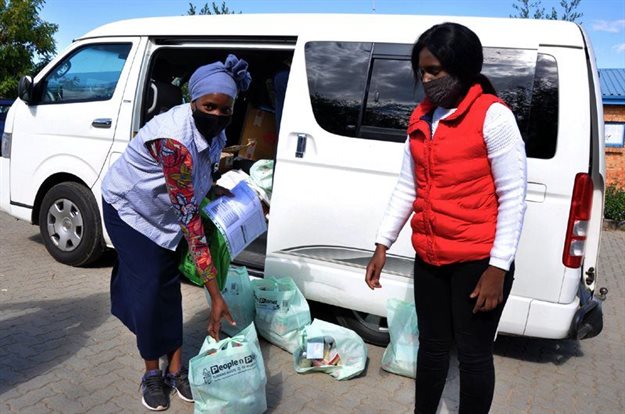"The last four months have thrown open the playbook on how we should be addressing the educational challenges facing [orphaned and vulnerable] learners and students in our townships," says James Donald, CEO for the Tomorrow Trust, a non-profit organisation (NPO) with 15 years' experience in educating under-resourced youth.
Part-funded by the Datatec Education and Technology Foundation, which supports educational organisations in under-resourced communities across South Africa, the Tomorrow Trust aims to develop both academic and life-skills proficiencies in children referred to it through the Department of Social Welfare and via feeding programmes run through several township-based schools.
Donald notes that the NPO has had to respond to a rising lack of access to basic food, hygiene equipment, winter clothing, online learning and psychosocial support. “We’re addressing issues beyond the obvious educational need,” he says. “For instance, we’ve noticed an increase in after-hour calls our college/university students are making to a psychologist available through a 24-hour cellphone line we provide.” The Tomorrow Trust has also delivered over 4,000 self-care packages to students, the contents of which include sanitisers, masks and food vouchers.
Agility and responsiveness
“We have a moral imperative to act quickly and adapt what we thought worked previously, to try and lessen the impact these youngsters are facing and will continue to face,” Donald says, pointing out that even pre-Covid-19, for every 100 South African students, only 51 made it to matric, of whom only 40 graduated and 16 qualified for tertiary education. And of those, only two would graduate. “What’s needed is agility and responsiveness – the same principles that successful organisations and businesses have used to counter relentless challenges.”
The Tomorrow Trust has been stepping up to the plate from the start. A few days into the original Level 5 lockdown at the end of March, the NPO had frozen traditional programme rollouts, ensuring instead that its junior- and senior-level learners had academic notes, social-emotional activities, much-needed food parcels, and hygiene packs. A month or two into lockdown, its team of 16 full-time staff, all working remotely from home, had created a new six-month plan that would re-emphasize the Trust’s mission of providing holistic educational support.
Re-adapted school-learner support sees the NPO providing each household with food parcels, hygiene packs, winter clothing, stationery and textbooks, as well as educational toys. Senior-level learners are being encouraged to attend virtual classes, to get access to WhatsApp groups moderated by teachers, and to participate in WhatsApp webinars focused on career development and nurturing socio-emotional skills. To facilitate this, the Trust provides senior-level learners with 30GB of data each month.
“Unfortunately, access to data has been an issue for our college/university students, as some learning institutions haven’t followed through on the initial 30GB of data they provided in May,” says Donald. “So we’re addressing this with each student on a case-by-case basis, by buying data for them and looking into how we can get them access to a device of their own too.”
Psychological support
The 2020 academic year for tertiary-level students is now due to end in March 2021. With the NPO’s college/university students support team hard at work to motivate and plan for some students, especially those in areas of poor connectivity, to move back into residences, the issue of mental health has come to the fore. Pre-Covid, as many as one in six South Africans suffered from anxiety, depression or substance-abuse problems, according to the South African Depression and Anxiety Group (SADAG). And although statistics aren’t yet available for how this figure may have changed during the pandemic, anecdotal evidence certainly suggests that many South Africans are struggling emotionally with the fallout of the pandemic.
“During lockdown our students have continued to have fulltime access to a psychologist, and our sessions with them have been split between managing their online learning process and their various personal challenges, often mentally and emotionally related,” says Donald. “It’s been crucial that we don’t only take care of their educational needs, but also address their emotional needs.”
Datatec is fully supportive of the responsive, nimble nature of how the Tomorrow Trust is creatively tackling the twin challenges of academic and life-skills proficiencies among township youth. “We remain committed to investing in the work James and his dedicated team are doing, especially in this unprecedented time,” says Wilna de Villiers, group marketing and communications manager for Datatec. “It’s been proven that effective public-private partnerships, such as ours with the Tomorrow Trust, have a remarkable impact on learners and students.”






























